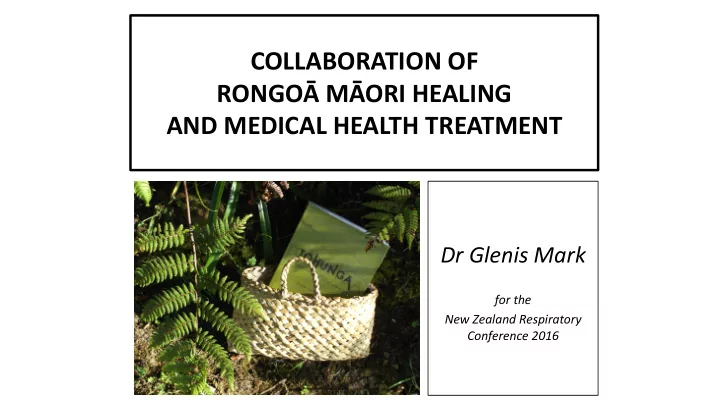

COLLABORATION OF RONGOĀ MĀORI HEALING AND MEDICAL HEALTH TREATMENT Dr Glenis Mark for the New Zealand Respiratory Conference 2016
OVERVIEW • Definition of rongoā Māori • Review the literature on collaboration • Healers views on collaboration • Patients’ views on collaboration • Is collaboration even possible? • Future research • Points of discussion for respiratory
BASIC DEFINITIONS IN THE RESEARCH RONGOĀ RĀKAU MIRIMIRI/ROMIROMI WAIRUA Plants and herbal Massage/Deep tissue Spiritual beliefs and remedies manipulation practices Multiple plant dosing for Te Oomai Reia - ancient Understanding matakite multiple conditions art of Māori healing (spiritual gifts) (Ngata, (Sporle, 1994) (O’Connor, 2008) 2014) Definition of mirimiri and Wairua healing practices romiromi (Mark, 2008) (Macleod, 1999; Mark, 2012) Relationship between wairua and Māori well- being (Valentine, 2009)
COLLABORATION RESEARCH • Rongoā should be provided through Māori health providers (Jones, 2000) • A trial pilot should be conducted to put collaborative framework into practice (Stewart et al, 2014)
HEALERS’ VIEWS ON COLLABORATION | What are the underlying values, beliefs and foundations of rongoā Māori healing? | Seventeen rongoā Māori healers | Narrative interviews | Rourou framework for analysis |
HEALERS’ VIEWS • Support For me, I believe the future of health is where you have a clinical doctor with all that scientific and academic area with healer or tohunga working together side by-side. • Ambivalent … there’s a huge change that needs to happen … which won’t, because the way the health system is set up at the moment. • Conflicting Actually, doesn’t belong, no it doesn’t actually belong in public health system. It actually belongs back with our people
PATIENTS’ VIEWS ON COLLABORATION | What do you think about healers and doctors working together? | Thirty patients of rongoā and medical treatment | Cultural adaptations to photovoice | Thematic analysis of participants’ talk
PATIENTS’ VIEWS ON COLLABORATION • Rongoā Māori can integrate, complement and work hand-in-hand with primary health care and patients show a strong desire for integration to happen • It would be highly beneficial for healers and doctors to work together and share knowledge, however, participants do not believe that doctors would be able to accept or embrace rongoā Māori healing or healers • Participants believed that it would be best if patients were treated by doctors separately to being treated by healers, but that doctors and healers could collaborate at a later stage
IS COLLABORATION POSSIBLE?
Adapted from: Cohen (2003) WESTERN MEDICINE RONGOĀ MĀORI Focus on pathology and curing disease Focus on influencing the health and healing of the person and their whanau Reductionist: Diseases are biological and Complex: Diseases do not have a simple treatment should produce measurable explanation, and outcomes are not always outcomes measurable Adversarial medicine: “How can I destroy Bigger picture : "What can the disease teach the disease? the patient? Is there a message or story in the disease?" Investigate medicine with a "divide-and- Looks at the causes and effects of disease conquer" strategy, looking for microscopic in the physical, emotional, environmental, cause social, and spiritual realms Intellect is primary. Medical practice is Intuition is primary. Healing is based on based on scientific theory spiritual guidance gained from ancestors, the environment and nature Physician is an authority Healer is the channel for the healing and advisor from the ancestors Fosters dependence on medication, Empowers patients to help them take technology, etc. charge of their own health Health history focuses on patient and Health history includes the environment: family: "Did your mother have cancer?" "Have you offended any tapu on any whenua?" Intervention should result in rapid cure or Intervention should result in the patient management of disease feeling better in their mind, body and spirit
SIMILARITIES • Treatment for illness (sometimes prevention) • Diagnosis • Variety of methods used to treat the patient • Advice given to the patient
DIFFERENCES • Underlying philosophy • Cultural value based • Validating research • Doctor suspicion of rongoā Māori
FUTURE RESEARCH • Continue to unpack the issues for doctors: Survey of medical professionals attitude to rongoā Māori – WDHB • Put collaboration into practice: Information gathering on collaboration framework and pilot intervention
RELEVANCE TO RESPIRATORY • Consideration of alternative treatments for asthma and respiratory illness • Giving patients different health treatment options and/or past and current rongoā use • Exploration of collaboration between doctors and healers for asthma and respiratory patients • Potential for collaborative and holistic health treatment for patients, healers and doctors
REFERENCES Jones, R. (2000). Rongoa Maori and Primary Health Care (Unpublished master’s thesis) . University of Auckland, Auckland. Mark, G. (2008). Conceptualising mind, body, spirit interconnections: perspectives of Māori and non- Māori healers (Unpublished master’s thesis). Massey University, Auckland, New Zealand. Mark, G. (2012). Rongoā Māori (Traditional Māori healing) through the eyes of Māori healers: Sharing the Healing while Keeping the Tapu (Unpublished doctoral dissertation). Massey University, Auckland, New Zealand. Mcleod, M. K. (1999). E iti noa na te aroha: a qualitative exploration into the realms of Maori healing (Unpublished master’s thesis) . University of Waikato, Hamilton. Ngata, R. (2014). Understanding Matakite: A Kaupapa Māori study on the impact of matakite/intuitive experiences on wellbeing (Unpublished doctoral dissertation). Massey University, Palmerston North, New Zealand. O’Connor, T. (2007). Governing bodies: A Māori healing tradition in a bicultural state (Unpublished doctoral dissertation). University of Auckland: Auckland, New Zealand. Sporle, A. (1994). Recording Maori Healing Practices. Te Maori News, 3 (20), 14. Stewart, A., Hudson, M., Brown, B., Mark, G., Timutimu, T. and Harré-Hindmarsh,J. (2014). Developing a collaborative approach to health service delivery involving rongoā practitioners and medical clinicians in te Tairāwhiti. Gisborne: New Zealand. Valentine, H. (2009). Kia Ngāwari ki te awatea: The relationship between Maori and well-being: a psychological perspective (Unpublished doctoral thesis. Palmerston North: Massey University.
Recommend
More recommend